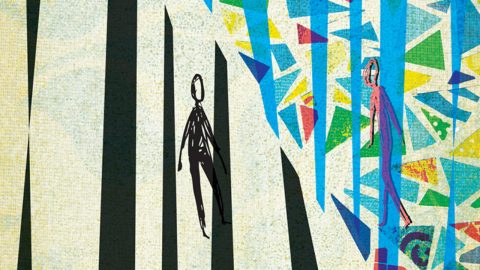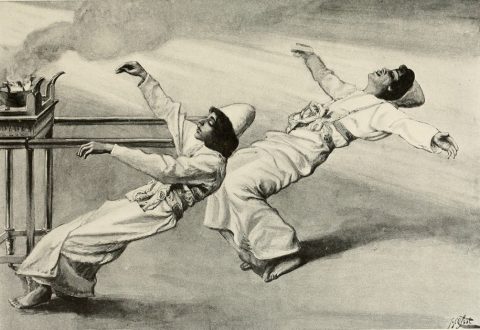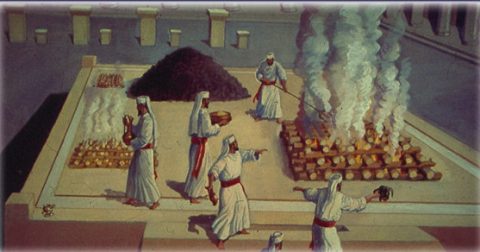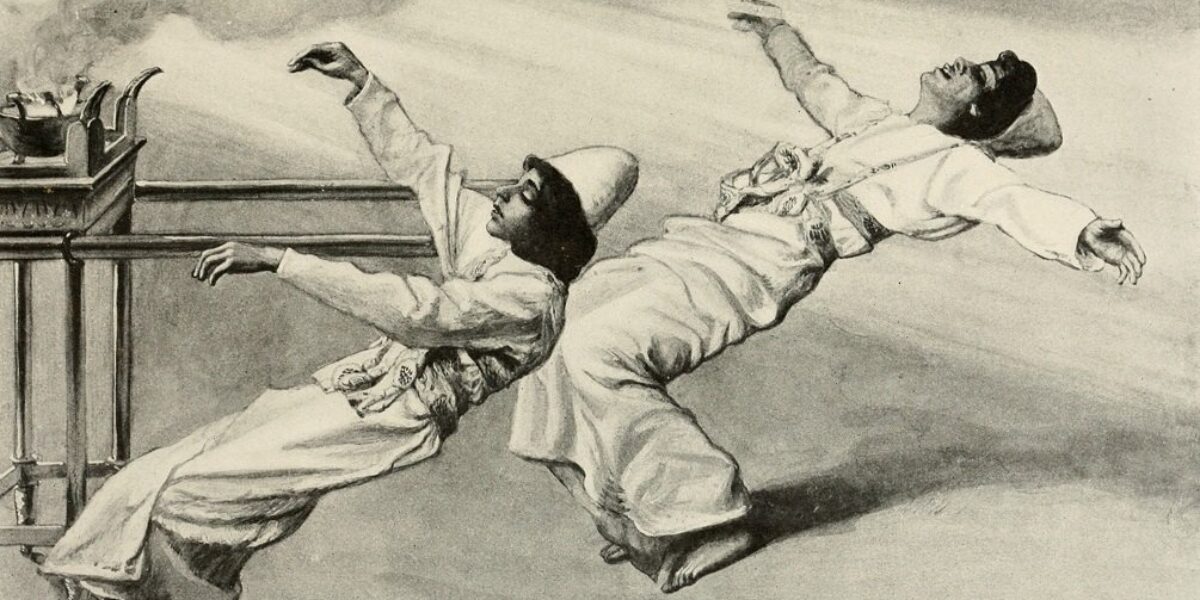Tazria and M’tzora (Lev. 12:1-15:33)

As the Torah Turns
Rabbi Lader’s Weekly D’var Torah
Tazria and M’tzora (Lev. 12:1-15:33)
This week, we have a double  portion for our Torah reading: Tazria and M’tzora (Lev. 12:1-15:33). These portions have a reputation for inspiring fear and dread in many a bar or bat mitzvah student who receives it for their Shabbat service. These portions speak of bodily functions, illness, and quarantine, in relation to: Childbirth, Contact with bodily fluids, and Disease of the skin… And the texts then go on to detail how, upon contracting these various conditions, individuals need to go through a series of separations, inspections, and ritual cleansings before they are allowed back into the community. In particular, the disease, called tzara’at, is not only a human disease; it can affect the walls of people’s homes, as well as fabric, thereby extending the boundaries and scope of its effect. Rabbi Joe Black, Senior Rabbi at Temple Emanuel in Denver, Colorado, recently suggested that these laws about tzara’at—which we translate as leprosy, but clearly is something else—are not included in the narrative to teach us solely about cleanliness, diagnosis or medical care. Rather, they are about our fears. Tzara’at, in our text, is a disease that clearly has a powerful impact on the Ancient Israelite community. It is not only experienced physically, but spiritually. The fact that houses can be infected, as well as humans, points to how scary this can be. And we, too, are in a very scary time. Writes Rabbi Black: “This time of quarantine, illness, and loss has taken its toll on all of us. The facts that we cannot be physically close to one another; that our economy is suffering; that our national political discourse has become so toxic, are taking a toll on us physically, emotionally and spiritually. We do not know how long this will continue. We worry about our health and those of our loved ones—some of whom are dealing with the coronavirus, others who are vulnerable, and others who are on the front lines providing medical care, research, support, and other crucial services that allow us to function. We worry about how we will emerge from our isolation and what our world will look like once we do. In Tazaria and M’tzora, our ancestors had to deal with the unknown. They were afraid of something over which they had no control. The rituals of isolation, immersion (in the mikvah to achieve ritual purification), and re-entry were designed to provide a safe framework for the people – the afflicted and the larger community – to feel that they were not endangered by this unseen enemy…” Perhaps one of our key tasks at this time is to try to understand and anticipate our fear of the unknown and our reactions to it. As such, Rabbi Black proposes the following seven questions/encouragements for each of us to explore as we continue on our journey:
portion for our Torah reading: Tazria and M’tzora (Lev. 12:1-15:33). These portions have a reputation for inspiring fear and dread in many a bar or bat mitzvah student who receives it for their Shabbat service. These portions speak of bodily functions, illness, and quarantine, in relation to: Childbirth, Contact with bodily fluids, and Disease of the skin… And the texts then go on to detail how, upon contracting these various conditions, individuals need to go through a series of separations, inspections, and ritual cleansings before they are allowed back into the community. In particular, the disease, called tzara’at, is not only a human disease; it can affect the walls of people’s homes, as well as fabric, thereby extending the boundaries and scope of its effect. Rabbi Joe Black, Senior Rabbi at Temple Emanuel in Denver, Colorado, recently suggested that these laws about tzara’at—which we translate as leprosy, but clearly is something else—are not included in the narrative to teach us solely about cleanliness, diagnosis or medical care. Rather, they are about our fears. Tzara’at, in our text, is a disease that clearly has a powerful impact on the Ancient Israelite community. It is not only experienced physically, but spiritually. The fact that houses can be infected, as well as humans, points to how scary this can be. And we, too, are in a very scary time. Writes Rabbi Black: “This time of quarantine, illness, and loss has taken its toll on all of us. The facts that we cannot be physically close to one another; that our economy is suffering; that our national political discourse has become so toxic, are taking a toll on us physically, emotionally and spiritually. We do not know how long this will continue. We worry about our health and those of our loved ones—some of whom are dealing with the coronavirus, others who are vulnerable, and others who are on the front lines providing medical care, research, support, and other crucial services that allow us to function. We worry about how we will emerge from our isolation and what our world will look like once we do. In Tazaria and M’tzora, our ancestors had to deal with the unknown. They were afraid of something over which they had no control. The rituals of isolation, immersion (in the mikvah to achieve ritual purification), and re-entry were designed to provide a safe framework for the people – the afflicted and the larger community – to feel that they were not endangered by this unseen enemy…” Perhaps one of our key tasks at this time is to try to understand and anticipate our fear of the unknown and our reactions to it. As such, Rabbi Black proposes the following seven questions/encouragements for each of us to explore as we continue on our journey:
1 – Research has shown that staying physically active during quarantine is an essential part of staying healthy. Am I engaging in enough physical activity?2 – For those who are in quarantine with others: Am I aware of the needs of others in my home? Am I doing all that I can to understand what they are going through as well me? Am I tolerant of my own missteps as well as those with whom I am living?3 – Am I doing all that I can to be productive during this time? Are there tasks that need to be completed? Do I have meaningful outlets for creativity other than television, the internet, and other passive activities?4 – Am I looking for ways to help others? Are there ways that I can volunteer my time or expertise as well as my financial resources?5 – Am I willing to receive help from others?6 – Psychologists teach us that it is important that we not dwell too long on the length of time that we have been—or will be—socially distant. We need to remind ourselves that this is a temporary situation that will be resolved someday. We also need to be “in the moment” as much as we can.7 – There will be times when our fears will get the best of us. No one can be strong all the time. Have I been able to forgive myself for those moments when I don’t feel productive or give into the despair of the moment?
These, indeed, are challenging times, and, like our ancestors wandering in the wilderness, there is much that we do not know. At the same time, however, we also have the blessing of being part of a sacred community that cares for one another. Let us acknowledge our fears, and then step forward towards healing: … Spur us to take swift actionInspire us to do what we canfor those who are more vulnerable than usHelp us to transcend the false divisionsof clean and uncleansypmtom-free and symptomatichealthy and sickInside and outside the campMay we let this virus teach us Just how interconnectedWe all really are– excerpt from “Quarantine” by Cantor Abbe Lyons
From Previous Weeks

Sh’imini – Lev. 9:1-11:47 (4/17-18)
This Shabbat, we return to our Torah readings as we make our way through Leviticus.

Shabbos Chol HaMoed
The special Torah reading for this Shabbat during Chol HaMo-eid Pesach, the intermediate days of Passover, is Exodus 33:12-34:26…

Tzav – Lev. 6:1-8:36 (4/3-4/4)
Our Torah portion this week is Tzav – Lev. 6:1-8:36, and deals with the offerings that the priests and the people made…

VaYikra – Lev. 1:1-5:26 (March 28/29)
This week we begin the book of Leviticus – VaYikra – Lev. 1:1-5:26. Rabbi Shai Held writes: “Around this time each year, the…

